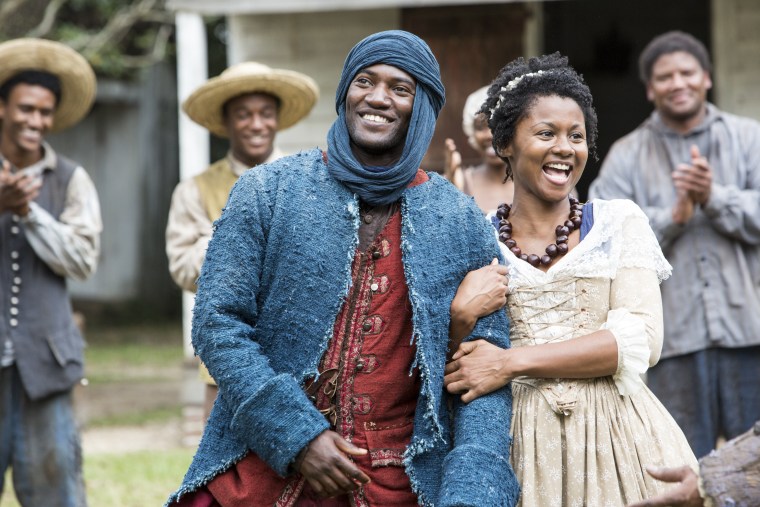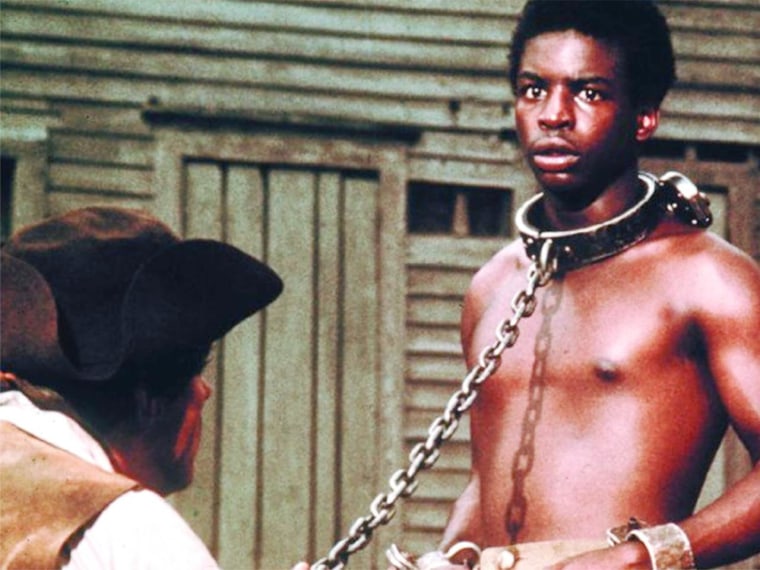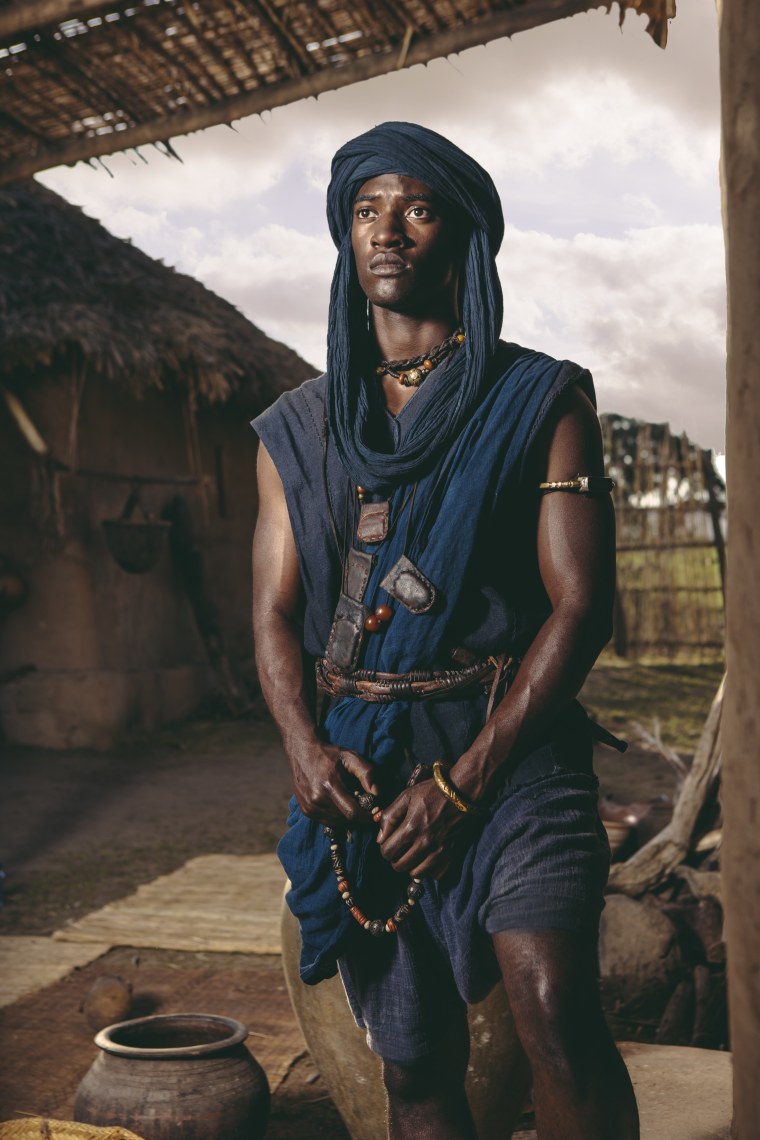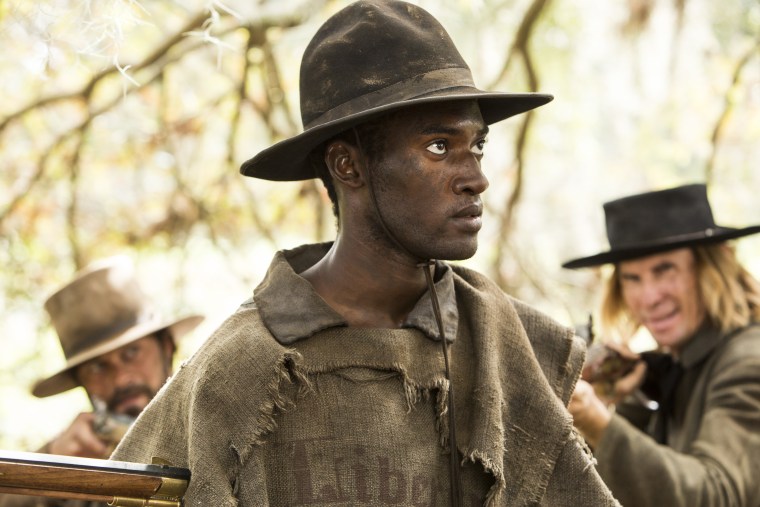Malachi Kirby says it was literally a spiritual journey to take on the iconic role of Gambian warrior Kunta Kinte in the History Channel's daring remake of the 1977 mini-series, Roots.
“On the set, I got down on my knees, prayed, and asked God to help me to tell the truth,” Kirby admits.
Nevermind the pressure of taking on the role made famous by LeVar Burton in the original. (Burton is a co-executive producer on the History remake.)
NBCBLK Contributor Sabrina Campbell caught up with the actor to talk about why he didn't watch the original when preparing for the role and how this remake will impact the Black Lives Matter generation.
Roots will premiere on History on Memorial Day, airing over four consecutive nights at 9 p.m. The four-night, eight-hour event series is a historical portrait of American slavery recounting the journey of one family and their will to survive and carry on their legacy.

What do you think the remake of Roots will mean to people in 2016?
I remember when I first watched the original, the impact that it had on me was profound. It changed my whole outlook on life and the world I was living in at the time. Who I was, where I came from and just how I fit into the society right now. For those who don’t know that part of history, I believe it will have a very different impact as opposed to those who do. But even for those who have seen the original and for those who have done their own research into that time, I believe that the show will have an impact on them regardless. We did not hold back with the truth.
The conversations that happen after that will be just as important if not more. I think that a lot goes unsaid. I don’t think it’s a coincidence that Birth of a Nation and Underground and other projects are coming out with a similar narrative in regards to slavery in that same time period. There’s a reason for it, you know? There’s a discussion that needs to be had and there are changes and actions that need to be made.
Lupe Fiasco described his thoughts on how A&E should handle the conversations surrounding Roots and the discussion that needs to happen on camera before and after the show airs; some of those you have retweeted. What are your thoughts on his comments and his suggestions for the remake?
I think that’s very important. I remember speaking to people from my mother and grandmother’s generation who had seen the original. I remember sitting down with them and hearing them describe how after they saw the original movie, they would go into school the next day and get into fights.
It’s very easy to take this kind of subject matter out of context especially for a younger generation of kids. Kids under, I’d say 14, are still maturing, they are still growing, they are still understanding themselves. To hit them with something like Roots, to hit them with this particular period of time, it’s important, to discuss the matters beyond the program itself.
I remember when I watched the first one. I had to pray about some of the feelings I was feeling. There was inequity in my heart, there was a lot of pain, there was a lot of hurt; there was a lot of confusion. You need to know how to deal with those things. That’s not just for black people; it’s for white people too. Understanding how to deal with that type of guilt and shame and understanding that that was the past and this is right now. All across the board, especially for young people, there are mental issues that need to be addressed when watching something like this.

You touched on how your spirituality played a part. Along those lines, what type of preparation was required for this role: mind, body, and soul?
The first decision I made was to not go anywhere near the original when trying to begin this journey. I felt like the only way that I could tell the truth of this project is by telling my own truth and not trying to recreate another performance. There wasn’t a lot of time to do everything that needed to be done. It was learning how to speak Mandinka, the language and the dialect and the accent. It was an understanding the culture, the tradition, and the religion of the Mandinka people. Understanding how they sat, how they ate, and how they would greet an elder, just how they conducted themselves.
I wanted to know these things so that I could portray them with that same pride, same respect and understanding; that same truth. Then there was something else that I just didn’t know how to prepare for. Which was, what is it like to go through slavery? What is it like to be on a boat in chains taken away from your family? Kunta Kinte was not born into slavery; he was born a free man. He was an African man. He was a Mandinka warrior. He was at the beginning of his manhood. Then he gets kidnapped and taken onto a boat. Possibly one of the most vulnerable positions you can ever be in as a man, you know?

How does it feel to want a son your whole life but then get a daughter, but not only that but you’re having a daughter in the midst of slavery when you’re aware that as she grows up, she most likely will be raped and you most likely will just have to deal with it? I have no idea how to process that on a human level.
So for me, the most important thing for me to do and the most helpful thing that I found was prayer. I felt like there was a story that needed to be told that was bigger than me and bigger than what I can do by myself. There was information that I needed that I didn’t have access to and I just believe that God does. So I asked him to help every single day. On the set I got down on my knees, prayed, and asked God to help me to tell the truth. A truth that was bigger than my experience and bigger than my knowledge.
When Kunta eventually submits from the whipping posts and he says the name Toby. I learned that it wasn’t a form of submission it was a form of survival.
What was the most difficult scene that comes to mind?
There wasn’t one day that didn’t present a challenge. There were scenes in the boat that I thought to myself the Africans that were actually in enslaved and put on that boat, would have been in that slave hold for at least 3 weeks before they came up to see any daylight. So I thought the least that I could do is stay in there for a whole day. And so I do, when we did those scenes I did not come out of the hole, I did not come out to the toilet and I did not come up to eat.
We had the benefits and the challenge of them actually building a real ship to the real dimension that it would’ve been at the time. They put 150-200 people into that hold and they chained us all up in real chains. You’re basically in this thing for the whole day wailing and screaming and singing. You don’t have to imagine what that feels like because you’re there. If you’re in that environment then you’re responding to it. When you’re in there for even half-an-hour you forget that this is a movie. In coming out of it, it is hard to interact with people; it’s hard to shake that off.
Then we have the whipping scenes. Again there is the pain that I was never actually going to physically feel. I don’t know what it’s like to be whipped physically. I don’t know what its like to have your identity directly forced out of you. I don’t what that feels like to have that all happen in the midst of all these other witnesses. Again, it was a day I asked God for help, and I got more help than I was expecting and more help than I was prepared for.
I remember there was a point where I felt like I could feel the pain of every ancestor that had ever come before me and have ever gone through that. I can hear their screams, I could hear their wails. I could feel their pain although I was never there, I could feel it. And it almost broke me; mentally and physically. It was the strangest experience and I wasn’t sure that I would be able to get up from it.
What was the most interesting scene?
As a human and as an artist, the most interesting for me was learning how to remain a Mandinka warrior and a father and a husband and keep that integrity whilst in the midst of surviving, that was the most interesting for me. When Kunta eventually submits from the whipping posts and he says the name, Toby. I learned that it wasn’t a form of submission it was a form of survival.
What is the feeling you get when you see a billboard for Roots knowing that you are the main character?
You know what, it hasn’t really hit me yet. I think I’m in a little bit of a bubble. Just being Malachi and just kind of getting used to being me again. I don’t think it’s really kicked in yet. I could pretty much still walk down the street without being pointed out or recognized or taken a picture of so it’s still very normal for me right now.
